Erica Vetsch's Blog, page 132
July 24, 2018
Ten Highlights from RWA 2018!
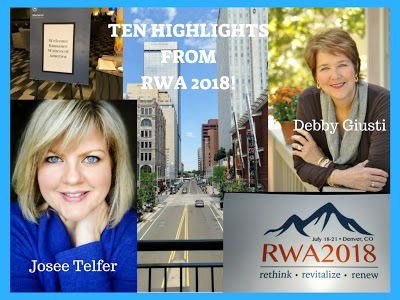
By Debby Giusti and Josee Telfer
Last week, writers from around the world gathered in Denver, Colorado, for the Romance Writers of America National Conference. Josee Telfer and I shared a room. We knew each other from Seekerville, and the friendship that had developed online grew deeper when we met in person and spent time together throughout the week. Josee is a 2018 Golden Heart finalist and first-time RWA National Conference attendee. I’m a 25-year RWA veteran and author of as many books so we decided to team up and provide an overview of what we each enjoyed most about the conference.
Debby's highlights!
 The Seekers: Mindy Obenhaus, Winnie Griggs, Mary Connealy,
The Seekers: Mindy Obenhaus, Winnie Griggs, Mary Connealy,Audra Harders and Debby Giusti at RWA 2018.
1. Connecting with other writers tops my list.About two thousand writers and industry professionals attend the national conference each year, and although that sounds like a lot of people, friendships form easily because we share a common bond with our love of writing. I’ve attended just about every national conference since 2005 so the week of conference always seems like a “coming home” of sorts. I see folks I’ve known for years. We quickly catch up on our writing careers, kids and grandkids and anything else that’s important in our lives. Throughout the year, we keep in touch via email and social media, but the time together at conference is always special, like icing on a friendship cake.
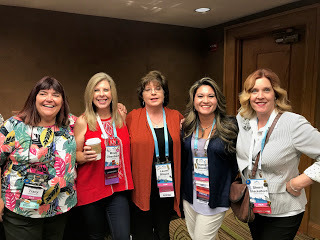 Love Inspired Authors (L to R) Pamela Tracy, Mindy
Love Inspired Authors (L to R) Pamela Tracy, MindyObenhaus, Laurel Blount, Sharee Stover and Sherry Shackelford
at the LI Meet and Greet.
2. Quality Time with my Editor and Publishing HouseI write for Love Inspired, the Christian arm of Harlequin. Each year at the conference, Harlequin hosts a number of informational meetings and gatherings to help their authors with marketing and promotion. In addition, we learn about new retail initiatives and the many innovative ways Harlequin ensures our books get into the hands of our wonderful readers. Along with marketing tips, IT support and Q & As, Harlequin also hosts a gala party for their authors. This year, we gathered at the Ritz-Carlton and danced the night away!
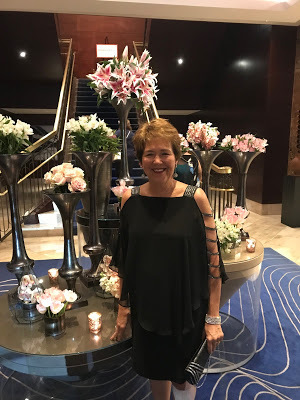 Debby Giusti at the Ritz-Carlton, Denver.
Debby Giusti at the Ritz-Carlton, Denver.3. WorkshopsThe conference runs from Wednesday through Saturday, and every day is filled with workshops that range from career and research to craft and the writer’s life. There’s something for everyone and for every level of expertise from the beginning writer to the multi-published, bestselling author.
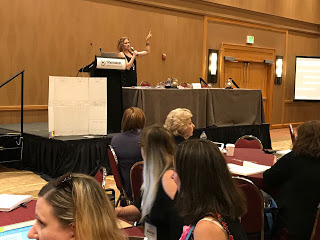 Alexandra SokoloffI attended Alexandra Sokoloff’s two-hour Immersion session, “Stealing Hollywood.” An acclaimed screenwriter and novelist, Sokoloff gives story structure workshops throughout the country based on her book, Screenwriting Tricks for Authors. At RWA, she talked about writing stories that engage the reader and started by providing an overview of Greek theater and the Three Act Structure that dates back to 400-600 BC.
Alexandra SokoloffI attended Alexandra Sokoloff’s two-hour Immersion session, “Stealing Hollywood.” An acclaimed screenwriter and novelist, Sokoloff gives story structure workshops throughout the country based on her book, Screenwriting Tricks for Authors. At RWA, she talked about writing stories that engage the reader and started by providing an overview of Greek theater and the Three Act Structure that dates back to 400-600 BC. As theater evolved, the second act in most plays grew longer and was often divided into two parts, Act II:1 and Act II:2. With the introduction of movies, each of the three (or four) acts were divided into segments, called sequences that ended with a hook. In the early days, movies were filmed on eight reels that each contained fifteen minutes of action. The reels—or sequences--ended with a cliffhanger to keep theater audiences in their seats and eager for the next segment of the story as the reels were being changed.
Over the years, that eight sequence format has been ingrained in theater goers as well as readers who expect eight hooks or turning points that grow toward the exciting final climax and resolution. Sokoloff encouraged us to use the eight sequence structure to satisfy reader expectations and to make our stories more compelling and marketable.
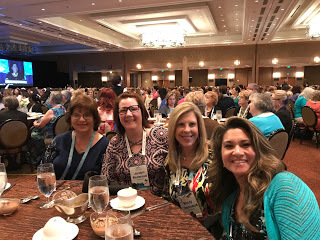 (L to R) Laurel Blount, Jordyn Redwood, Mindy
(L to R) Laurel Blount, Jordyn Redwood, MindyOberhaus and Sharee Stover at the Golden Heart
Luncheon.4. Published Author Network (PAN) WorkshopsIn addition to a plethora of workshops, the RWA provides something extra for both their PAN (published authors) and PRO (writers nearing publication) members.
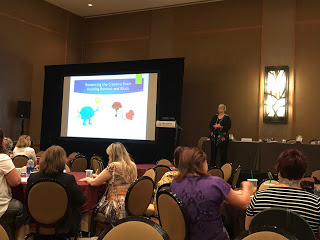 Rosanne Bane discusses how the brain functions.Rosanne Bane was this year’s PAN Keynote speaker. She calls herself a Creativity Coach who, as she says, “specializes in helping creative people understand why it’s so hard (at times) to do the very thing they love to do and what to do about that resistance.” Her workshop, “Romancing the Creative Brain: Avoiding Burnout and Block,” drew a huge crowd of published authors eager to learn constructive ways to navigate the writing life.
Rosanne Bane discusses how the brain functions.Rosanne Bane was this year’s PAN Keynote speaker. She calls herself a Creativity Coach who, as she says, “specializes in helping creative people understand why it’s so hard (at times) to do the very thing they love to do and what to do about that resistance.” Her workshop, “Romancing the Creative Brain: Avoiding Burnout and Block,” drew a huge crowd of published authors eager to learn constructive ways to navigate the writing life. According to Bane, stress is the new normal, which isn’t good for our mental or physical health. She showed us how the brain works with emphasis on the limbic system that deals with involuntary reactions, such as flight or fight responses, contrasted with the cortex that makes good, conscious decisions and is our creative, storytelling area. Stress stimulates the limbic and suppresses the cortex.
Chronic stress takes its toll with anxiety, sleep disorders and self-doubt. Self-care is necessary to inhibit the limbic and enhance cortex activity. To optimize brain function and enhance creativity, we need sleep, exercise, meditation and downtime to daydream. We also need to incorporate play into our busy schedules for a healthier and happier life!
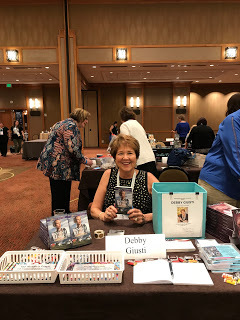 Debby Giusti at RWA's Literacy Autographing. 5. Book Signing for LiteracyAt the conference, RWA hosts the “Readers for Life” Literacy Autographing where 400-plus authors and thousands of readers connect. The publishers provide the books and proceeds from the sale of the books go to literacy organizations in the local areas. The 2017 signing raised more than $45,000, and since 1990, RWA has raised over $1 million for literacy organizations around the country.
Debby Giusti at RWA's Literacy Autographing. 5. Book Signing for LiteracyAt the conference, RWA hosts the “Readers for Life” Literacy Autographing where 400-plus authors and thousands of readers connect. The publishers provide the books and proceeds from the sale of the books go to literacy organizations in the local areas. The 2017 signing raised more than $45,000, and since 1990, RWA has raised over $1 million for literacy organizations around the country.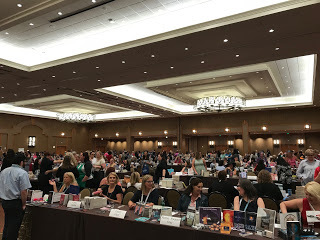 Look at the crowd of people at the
Look at the crowd of people at theAutographing for Literacy 2018!Meeting readers is what I love most about writing. One lady at the signing said she had driven from Colorado Springs to see me. Another woman maintains her direct mailing subscription with Love Inspired Suspense so she can get my books before they appear on bookstore shelves. A number of other readers shared the enjoyment they get from my books. As you can imagine, their comments touched me deeply. When I’m at home, sitting at my computer, struggling with a new story and wondering if I should continue writing, I'll remember their kind words and will be buoyed by their support.
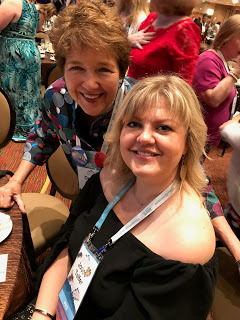 Debby Giusti and Josee Telfer
Debby Giusti and Josee TelferNow for Josee’s highlights! 6. Networking. Hands-down, the best thing about the RWA conference was meeting so many fantastic people. It was an opportunity to finally see many of my online friends IRL (in real life.) I also had the privilege of meeting authors I admire (and I did my best not to fangirl all over them.)
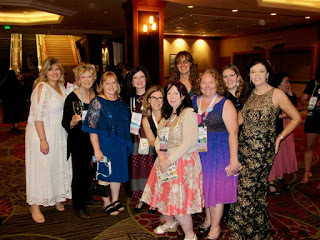 The Golden Heart Persisters pose for a photo!In my Golden Heart Group, The Persisters, I spent time with other finalists and formed friendships I’ll carry throughout my life. Encounters with industry professionals whether in the lobby, the elevators, and the hallways lead to important connections as we build our platforms and grow our businesses. For many authors, it may be the only time they meet with their agent and editors face to face. You never know who you may meet and what that will lead to. In my case, I shared an Uber with two talented authors and all-around lovely ladies whose books I adore. I also thanked an agent who rejected my query because I wanted her to know how deeply I appreciated her gracious, personalized and thoughtful response and that it was a turning point in my career.
The Golden Heart Persisters pose for a photo!In my Golden Heart Group, The Persisters, I spent time with other finalists and formed friendships I’ll carry throughout my life. Encounters with industry professionals whether in the lobby, the elevators, and the hallways lead to important connections as we build our platforms and grow our businesses. For many authors, it may be the only time they meet with their agent and editors face to face. You never know who you may meet and what that will lead to. In my case, I shared an Uber with two talented authors and all-around lovely ladies whose books I adore. I also thanked an agent who rejected my query because I wanted her to know how deeply I appreciated her gracious, personalized and thoughtful response and that it was a turning point in my career.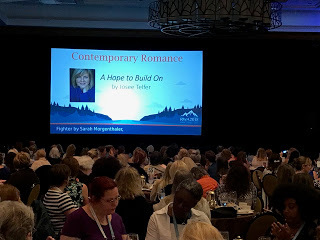 Josee Telfer's name and story are up in lights as
Josee Telfer's name and story are up in lights asthe Golden Heart Finalists are announced in the
Contemporary Category.
7. Fun times. Many of us spend a lot of our time in yoga pants at our desks but conference gives us an opportunity to get gussied up. Whether it’s the Golden Heart luncheon, dancing at the Rita’s, our publisher parties or dinner out with our tribe, it’s good to eat, laugh and cut the rug with our new and old friends.
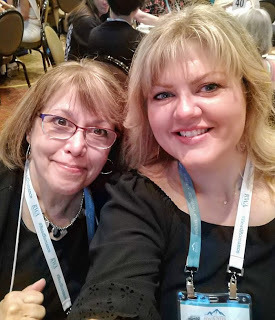 Josee Telfer (L) with mentor Tina Radcliffe at
Josee Telfer (L) with mentor Tina Radcliffe atthe Golden Heart luncheon.
8. Education. Whether you’re a newbie or have just published your fiftieth novel, RWA offers something for everyone. There are classes for every sub-genre, as well as workshops for hybrid and indie published authors. Sessions run the gamut, from marketing your book, social media presence and branding, to in-depth classes on the writing craft and time management. Education happens outside of workshops as well. I learned a lot from conversations where someone shared a word of advice, or an experience that provided a fresh perspective.
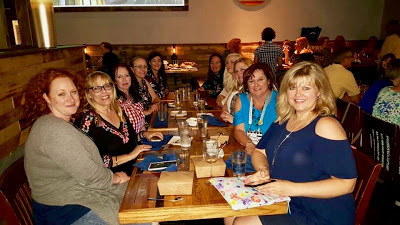 Josee Telfer and the Golden Heart Persisters enjoy dinner together!
Josee Telfer and the Golden Heart Persisters enjoy dinner together!9. Challenging Yourself. It’s easy to get comfortable in our writing caves where we rarely have to venture outside and beyond our imaginations. There’s nothing simple about traveling but it’s good to push ourselves outside our comfort zones. It keeps us sharp and agile and you never know when inspiration will strike. You’ve got to live life to write it.
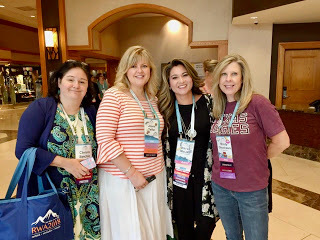 Christa Sinclair, Josee Telfer, Sharee Stover and
Christa Sinclair, Josee Telfer, Sharee Stover andMindy Obenhaus in the hotel lobby.
10. Brainstorming. I got two novel ideas while in Denver which came from conversations with editors and other writers. These conversations often provide inspiration. Maybe you’re unsure of which direction to take in your career, perhaps you’re stuck in a current novel and don’t know your way out, or maybe you’re coming up empty with fresh ideas for new stories. The conference was a reminder for me to get out more and meet with fellow authors whenever possible to brainstorm, learn, grow and laugh.
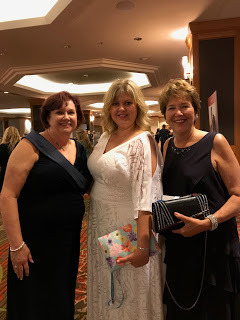 L to R: Tracy Brody, Josee Telfer and Debby Giusti
L to R: Tracy Brody, Josee Telfer and Debby Giustigather after the RITA Award Ceremony.I hope you enjoy the photos we posted today and the glimpse we provided into this year’s RWA conference. Josee and I are eager to read and answer your comments and questions. Let us know what you like best about writing conferences or what you hope to learn from a conference you someday plan to attend.
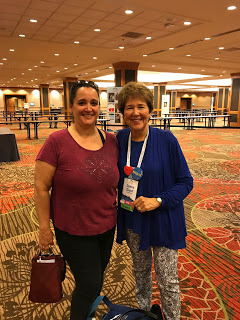 Villager DebH lives in the Denver area and
Villager DebH lives in the Denver area andstopped by the conference to say hello!
Each name will be included in a drawing for the first giveaway of the fourth and final book in my Amish Protectors Series: Amish Christmas Secrets. Josee is giving away Pure Vermont Hard Maple Candies to the winner so be sure to leave a comment.
 Goodbye, Denver! We'll see everyone next year at
Goodbye, Denver! We'll see everyone next year atRWA 2019 in New York City!Happy writing!
Wishing you abundant blessings,Debby Giusti and Josee Telferwww.DebbyGiusti.comhttps://www.joseetelfer.com/
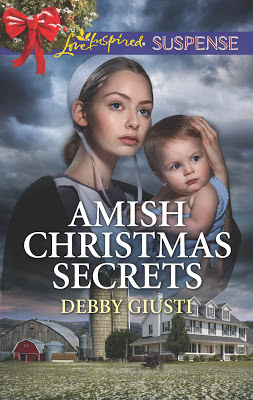
AMISH CHRISTMAS SECRETSBy Debby Giusti
Safe Haven for the HolidaysThe thrilling Amish Protectors conclusionLeaving the nursing home where she works, Rosie Glick’s accostedby a man demanding incriminating evidence her murdered boyfriendstole—until Ezra Stoltz scares him off. Now with a killer dead set onsilencing the Amish single mother, Ezra must hide Rosie and her babyto keep them safe. But can he expose a sinister conspiracy in timeto save the woman he secretly loves?
Pre-order here!
Josee Telfer writes contemporary romance from her home in Vermont which she shares with her husband and three children. This year she was honored to be an RWA Golden Heart Finalist. She is represented by Ann Rose of Prospect Agency and is excited to begin shopping her first novel. (Well, her agent will do that. She'll be working on her next project while trying not to anxiously twirl her hair out of her head.)
Publishers Weekly bestselling author DebbyGiusti is also a medical technologist who loves working with test tubes and petri dishes almost as much as she loves to write. Growing up as an Army Brat, Debby met and married her husband--then a Captain in the Army--at Fort Knox, Kentucky. Together they traveled the world, raised three wonderful Army Brats of their own and eventually settled in Peachtree City, Georgia, where Debby spins tales of suspense that touch the heart and soul.
Debby’s stories have won numerous awards, including two Daphne du Maurier Awards for Inspirational Suspense, the National Readers’ Choice Award, the Golden Quill, the Beacon, the Gayle Wilson Award of Excellence and the Write Touch. In addition to full-length fiction, Debby has written magazine articles for Southern Lady, Woman’s World, Our Sunday Visitor, Army and Family, and served for over twelve years on the editorial advisory board of ADVANCE for Administrators of the Laboratory.
Published on July 24, 2018 21:00
July 22, 2018
How to Write a Killer Author Bio

Last month, we took a look at what goes on a "One Sheet" or "Pitch Sheet." One of the MUST HAVE items is an author bio.
In a single paragraph, you're supposed to capture your entire writing resume, personality, and social media platform. It's supposed to be informative, relatable, and NOT boring.
Sounds easy, right? You can knock that out in a couple minutes, right?
If you're like me, probably not.
So, how does one go about putting together this marvel of succinct awesomeness?
Here are a few tips to help you craft a Killer Author Bio:
Use third person, make it sound like you, and establish your credibility - Author bios are written in third person. Readers will know that the bio is written by the author, but pretend it wasn't.
Published on July 22, 2018 21:00
July 20, 2018
Weekend Edition

If you are not familiar with our giveaway rules, take a minute to read them here. It keeps us all happy! All winners should send their name, address, and phone number to claim prizes. Note our new email address and please send your emails to Seekerville2@gmail.com

Monday: Jan brought us examples of how she uses words to capture the reader's imagination. Winner of an e-book copy of A Home for His Family is Kaybee!
Tuesday: Ruthy popped in to celebrate the release of her newest Love Inspired "Her Cowboy Reunion" available nationwide at Walmart, Kroger, Winn Dixie, wherever mass market paperbacks are sold, and even at some Barnes & Nobles! Go them! Check out Ruthy's newest Western series... "When three Steel Magnolias are forced to spend a year in western Idaho, will the region... and the cowboys... ever be the same again?
Wednesday: Melanie Dickerson challenges us to Write Confidently, Even If That Scares You. Challenge accepted! A copy of Melanie's recent release, The Orphan's Wish goes to Jeanne T!
Thursday: The delightful Richard Mabry stopped in to talk effort and accomplishment on Friday and he was wonderful, as always. His newest book "Guarded Prognosis" has hit the Kindle marketplace with a bang... as it should! Richard wants to do a giveaway, so we're doing that THIS WEEKEND! An e-copy of "Guarded Prognosis" for one lucky weekend commenter!
Friday: Matt Mikalatos shared 7 Ways Fiction Can Break Through When Non-Fiction Fails. Tyndale House is giving away a copy of The Crescent Stone to one lucky commenter and that commenter is ... Vince!

Monday: Erica Vetsch offers her vast knowledge on the subject as she explains How To Write A Killer Author Bio.
Wednesday: Publishers Weekly bestselling author Debby Giusti and RWA Golden Heart finalist Josee Telfer will share thoughts about the Romance Writers of America National Conference 2018. Be sure to stop by and learn what both ladies--who roomed together--thought about the conference. One lucky person who comments will receive a surprise giveaway. Friday: Location, Location, Location, we've all heard that, haven't we? Pam Hillman brings it to life in her books.

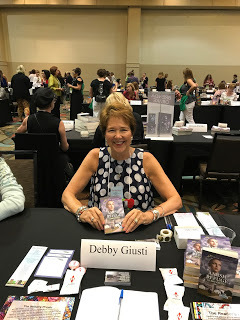
ROMANCE WRITERS OF AMERICA NATIONAL CONFERENCE2018 Literacy Autographing InformationWhen: Saturday, July 21, 3:00 - 5:00 p.m. MTWhere: Sheraton Denver Downtown Hotel, Plaza Ballroom (Plaza Building, Concourse Level)Proceeds from book sales benefit ProLiteracy Worldwide and Literacy Coalition of ColoradoThis event is open to the public and is free of charge to attend.More than 400 authors will be signing, including our own DEBBY GIUSTI. The seatingis alphabetical so look for Debby in the "G" row and be sure to stop by hertable and say hello!
 Pam again... still celebrating the release of
The Road to Magnolia Glen
. :)
Pam again... still celebrating the release of
The Road to Magnolia Glen
. :)I'm a sponsor at the Christian Fiction Summer Reading Safari.
Read! Review! Win books! (It really is that easy!)
Click here to join the fun for the entire month of July!
Melanie made a "Big Announcement" this week: She's delving into new territory with this Southern Historical Romance! And it comes out in just a month and a half!!! Check it out and Pre-Order it on Amazon!
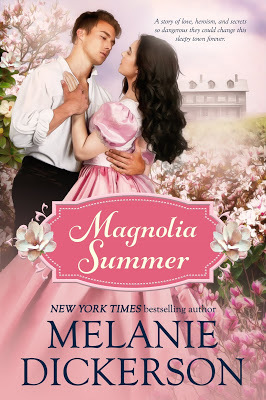
P.S. Isn't this cover so dang PRETTY???!!!
2018 Maggies Announcement! Here are the finalists in the Published Division of the Maggie Award for Excellence, Spiritual Elements... hearty congratulations go out to all these folks, a bunch of Seekerville favorites!
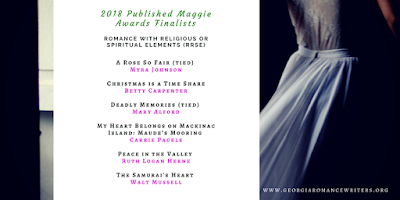 Celebrating a First Sale! Seeker villager Pat Jeanne Davis let us know that she signed a contract with Elk Lake Publishing for her historical romance! Congratulations, Pat!
Celebrating a First Sale! Seeker villager Pat Jeanne Davis let us know that she signed a contract with Elk Lake Publishing for her historical romance! Congratulations, Pat!And this just in from the Unpublished Maggie Award for Excellence!!! Congratulations to all of these wonderful gals! Connie, Christy, Cindy, Dianna and Christy again! We are so proud of you!

And Ruthy (Ruth Logan Herne) has lovely news... a romance anthology of novellas hitting the market next Tuesday, 7/24, but you can Preorder It Here! Perfect for beach reads... or any old place you want to smile and sigh! And all written by this multi-published, award-winning author!
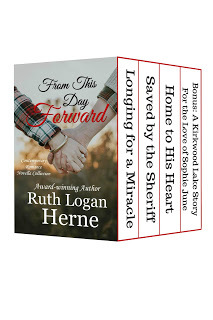

5 Reasons to Give Up On Your Novel (and 1 Reason Not To) by Janice Hardy at Fiction University.
How to Write Unique Themes from K.M Weiland's blog.
What Can Happen with Your Writing One Year from Now? by Lucinda Secrest McDowell at The Write Conversation.
4 Signs You Might be Confusing, Not Intriguing, in Your Opening Scene by Janice Hardy at Fiction University.
Do you need help with Time Management ? Check out Sarra Cannon's blog, Heart Breathings, as she discusses all things writing efficient.
Do Publishers Care About An Author's Online Presence? by Debbie Emmitt at Live, Write Thrive
For a complete list of the 2018 RWA Golden Heart and RITA award winners, check out Romance Writers of America.
Published on July 20, 2018 21:00
July 19, 2018
7 Ways Fiction Can Break through When Nonfiction Fails
by Guest Author Matt Mikalatos
 Think of your reader as a walled city. Inside the walls are their thoughts, feelings, hopes, and insights. They have built up a lot of defenses to prevent random people from accessing those things. They want to control what comes in and out of their city. As writers we want to access that city because we want to transform it in some way. We get to choose between using a battering ram or a Trojan Horse. A battering ram is brute force: facts, figures, charts, logic, and so on. The battering ram gains entrance by overwhelming the reader’s defenses. Fiction, on the other hand, is a Trojan Horse. The reader allows a story past the defenses because of his or her desire to receive a gift—entertainment. Then we effect change from the inside.So let’s talk about seven ways fiction can break through those walls:
Think of your reader as a walled city. Inside the walls are their thoughts, feelings, hopes, and insights. They have built up a lot of defenses to prevent random people from accessing those things. They want to control what comes in and out of their city. As writers we want to access that city because we want to transform it in some way. We get to choose between using a battering ram or a Trojan Horse. A battering ram is brute force: facts, figures, charts, logic, and so on. The battering ram gains entrance by overwhelming the reader’s defenses. Fiction, on the other hand, is a Trojan Horse. The reader allows a story past the defenses because of his or her desire to receive a gift—entertainment. Then we effect change from the inside.So let’s talk about seven ways fiction can break through those walls:
1. Fiction accesses the emotions rather than the intellect.
Many of us see the world and make decisions based largely on emotional criteria (even when we think we aren’t). Stories speak to emotion. That’s why when someone trots out all the statistics about, say, immigration, one side will respond by telling a beautiful story about an immigrant who came to the U.S. and escaped terrible suffering, and the other side will tell the story of an irresponsible immigrant who killed someone in a drunk-driving accident. Story connects us to raw, powerful emotions that can sweep right over the facts and take us to conclusions in opposition to them.
2. Story creates empathy and compassion for others.
You don’t have to know a single person from Africa, or have ever been to Africa, to read and be moved by Chigozie Obioma’s The Fishermen. But you can learn about his world, about growing up in poverty and political unrest, without leaving your living room. Stories teach us about our differences, yes, but also the universal reality of the human experience as people all made in the image of God.
3. In fiction, the reader constructs their own arguments to make sense of the events.
A well-written story may leave the reader to piece together what happened and why, and what led to that result—a lot like real life. A classic example of this is the story “The Lady, or the Tiger?” by Frank R. Stockton. In the story, we’re told that a princess looks down on her beloved in the arena, and there are two doors: behind one is a beautiful woman who her beloved will marry (and not be with her), and behind the other is a man-eating (literally) tiger. The princess knows what is behind each door, but her lover does not. She points to a door, telling him to open it. The question posed to the reader is, “What lies beyond that door?” The story doesn't tell us, but I’ve sat in classes where readers passionately defend the “real” ending to one another. The human response to story is to make patterns, to create meaning.
4. A good story can be revelatory to the reader . . . about the reader’s own heart.
I was reading a novel by Percival Everett (pretty sure it was Glyph). More than a third of the way into the book, the narrator reveals his ethnicity. In fact, he reveals it and then says, “I bet you thought I was white, didn't you?” In fact, I had thought he was white. Because at that time, my assumption was that white was the “default.” It was a stunning moment—the author not only revealed something to me, but knew what my reaction was going to be. He had baked it into the center of the book. It—no exaggeration—changed my life.
We see the same thing being done in the story of the prophet Samuel going to David and telling him a story about an injustice (a rich man has stolen a poor man’s sheep). David is furious and demands justice—and Samuel says, simply, “You are that man.” Do you think the story might have been different if Samuel had walked in and said, “Let me lay out the facts. You slept with another man’s wife and then murdered him. Does that cover it?”
5. Story can reveal a truth without ever stating it.
I love Les Miserables, which works on so many levels and has so many profound insights that it has become rightfully beloved worldwide. It’s a deeply Christian book about redemption that is celebrated by people of all faiths. A great example of story revealing truth without ever saying it is found in what Les Miserables teaches about prayer.
I may have missed one, but as far as I know, every single prayer uttered by a character in Les Miserables—prayers for protection, for justice, for provision—is answered, and often in miraculous, borderline-unbelievable ways.
6. If story is so important, why are you writing an essay?
Once upon a time, there was a woman named Harriet Beecher Stowe. Distressed and angered by the political situation of her day, and particularly by the horrors of slavery, she began to write a story, which was serialized in a newspaper called The National Era. It was the story of a longsuffering Christian slave named Tom and the horrific abuses he experienced in slavery, which ended in his death. The story left no room for any conclusion other than this: Christianity was incompatible with owning slaves. When collected into a novel called Uncle Tom’s Cabin, Stowe’s book became the second bestselling book of the century (with the Bible in the #1 slot). Her book deeply impacted the people of the United States, to the point that when Abraham Lincoln met her during the Civil War, he called her “the little woman who wrote the book which caused this great war.” Her little story had literally changed the world.
7. “The quote is apocryphal.”
It’s likely Abraham Lincoln never said those words to Harriet Beecher Stowe. It was first put down in print in 1896. Lincoln scholars think it may have been invented and then propagated by professors, authors, and other people who loved literature as a way to show the enduring power of fiction. And guess what? Here we are, 122 years later, still telling that story.
As for me, I wrote a story about a young woman named Madeline Oliver who has a fatal lung disease. Her friend Jason Wu has experienced a tragedy so deep that he has vowed never to tell a lie again. Together they are invited into a fantasy world called the Sunlit Lands, where they discover things about themselves and the world that would be impossible for them to learn another way. The novel, The Crescent Stone, deals with painful contemporary issues in our world without ever turning into an essay—but rather by connecting us with people we come to care about. I hope you enjoy it!
 About Matt:
About Matt:
Matt Mikalatos writes books (surprise!). In the past, Matt worked as a high school teacher and a comic book clerk, but currently focuses on nonprofit work devoted to helping people love one another despite their differences. He lives in Portland, Oregon, with his wife, three daughters, two unicorns, a gryphon, a dragon, and three brine shrimp.
About the book:
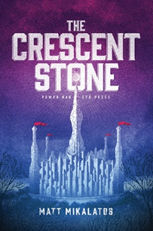 A girl with a deadly lung disease . . .
A girl with a deadly lung disease . . .
A boy with a tragic past . . .
A land where the sun never sets but darkness still creeps in . . .
A bargain that brings life, but may cost more than anyone can imagine . . .
Madeline Oliver has never wanted for anything, but now she would give anything just to breathe. Jason Wu skates through life on jokes, but when a tragedy leaves him guilt-stricken, he promises to tell only the truth, no matter the price. When a mysterious stranger name Hanali appears to Madeline and offers to heal her in exchange for one year of service to his people, Madeline and Jason are swept into a strange land where they don’t know the rules and where their decisions carry consequences that reach farther than they could ever guess.
THE CRESCENT STONE BY MATT MIKALATOSISBN: 978-1-4964-3171-4 | Softcover: $15.99
ISBN: 978-1-4964-3170-7 | Hardcover: $24.99

Tyndale House Publishers is giving away one copy of The Crescent Stone to one reader. Just leave a comment for Matt or whatever you'd like to share to enter. Winner will be announced in the Seekerville WE this Saturday. (Sorry, US mailing addresses only.)
 Think of your reader as a walled city. Inside the walls are their thoughts, feelings, hopes, and insights. They have built up a lot of defenses to prevent random people from accessing those things. They want to control what comes in and out of their city. As writers we want to access that city because we want to transform it in some way. We get to choose between using a battering ram or a Trojan Horse. A battering ram is brute force: facts, figures, charts, logic, and so on. The battering ram gains entrance by overwhelming the reader’s defenses. Fiction, on the other hand, is a Trojan Horse. The reader allows a story past the defenses because of his or her desire to receive a gift—entertainment. Then we effect change from the inside.So let’s talk about seven ways fiction can break through those walls:
Think of your reader as a walled city. Inside the walls are their thoughts, feelings, hopes, and insights. They have built up a lot of defenses to prevent random people from accessing those things. They want to control what comes in and out of their city. As writers we want to access that city because we want to transform it in some way. We get to choose between using a battering ram or a Trojan Horse. A battering ram is brute force: facts, figures, charts, logic, and so on. The battering ram gains entrance by overwhelming the reader’s defenses. Fiction, on the other hand, is a Trojan Horse. The reader allows a story past the defenses because of his or her desire to receive a gift—entertainment. Then we effect change from the inside.So let’s talk about seven ways fiction can break through those walls:1. Fiction accesses the emotions rather than the intellect.
Many of us see the world and make decisions based largely on emotional criteria (even when we think we aren’t). Stories speak to emotion. That’s why when someone trots out all the statistics about, say, immigration, one side will respond by telling a beautiful story about an immigrant who came to the U.S. and escaped terrible suffering, and the other side will tell the story of an irresponsible immigrant who killed someone in a drunk-driving accident. Story connects us to raw, powerful emotions that can sweep right over the facts and take us to conclusions in opposition to them.
2. Story creates empathy and compassion for others.
You don’t have to know a single person from Africa, or have ever been to Africa, to read and be moved by Chigozie Obioma’s The Fishermen. But you can learn about his world, about growing up in poverty and political unrest, without leaving your living room. Stories teach us about our differences, yes, but also the universal reality of the human experience as people all made in the image of God.
3. In fiction, the reader constructs their own arguments to make sense of the events.
A well-written story may leave the reader to piece together what happened and why, and what led to that result—a lot like real life. A classic example of this is the story “The Lady, or the Tiger?” by Frank R. Stockton. In the story, we’re told that a princess looks down on her beloved in the arena, and there are two doors: behind one is a beautiful woman who her beloved will marry (and not be with her), and behind the other is a man-eating (literally) tiger. The princess knows what is behind each door, but her lover does not. She points to a door, telling him to open it. The question posed to the reader is, “What lies beyond that door?” The story doesn't tell us, but I’ve sat in classes where readers passionately defend the “real” ending to one another. The human response to story is to make patterns, to create meaning.
4. A good story can be revelatory to the reader . . . about the reader’s own heart.
I was reading a novel by Percival Everett (pretty sure it was Glyph). More than a third of the way into the book, the narrator reveals his ethnicity. In fact, he reveals it and then says, “I bet you thought I was white, didn't you?” In fact, I had thought he was white. Because at that time, my assumption was that white was the “default.” It was a stunning moment—the author not only revealed something to me, but knew what my reaction was going to be. He had baked it into the center of the book. It—no exaggeration—changed my life.
We see the same thing being done in the story of the prophet Samuel going to David and telling him a story about an injustice (a rich man has stolen a poor man’s sheep). David is furious and demands justice—and Samuel says, simply, “You are that man.” Do you think the story might have been different if Samuel had walked in and said, “Let me lay out the facts. You slept with another man’s wife and then murdered him. Does that cover it?”
5. Story can reveal a truth without ever stating it.
I love Les Miserables, which works on so many levels and has so many profound insights that it has become rightfully beloved worldwide. It’s a deeply Christian book about redemption that is celebrated by people of all faiths. A great example of story revealing truth without ever saying it is found in what Les Miserables teaches about prayer.
I may have missed one, but as far as I know, every single prayer uttered by a character in Les Miserables—prayers for protection, for justice, for provision—is answered, and often in miraculous, borderline-unbelievable ways.
6. If story is so important, why are you writing an essay?
Once upon a time, there was a woman named Harriet Beecher Stowe. Distressed and angered by the political situation of her day, and particularly by the horrors of slavery, she began to write a story, which was serialized in a newspaper called The National Era. It was the story of a longsuffering Christian slave named Tom and the horrific abuses he experienced in slavery, which ended in his death. The story left no room for any conclusion other than this: Christianity was incompatible with owning slaves. When collected into a novel called Uncle Tom’s Cabin, Stowe’s book became the second bestselling book of the century (with the Bible in the #1 slot). Her book deeply impacted the people of the United States, to the point that when Abraham Lincoln met her during the Civil War, he called her “the little woman who wrote the book which caused this great war.” Her little story had literally changed the world.
7. “The quote is apocryphal.”
It’s likely Abraham Lincoln never said those words to Harriet Beecher Stowe. It was first put down in print in 1896. Lincoln scholars think it may have been invented and then propagated by professors, authors, and other people who loved literature as a way to show the enduring power of fiction. And guess what? Here we are, 122 years later, still telling that story.
As for me, I wrote a story about a young woman named Madeline Oliver who has a fatal lung disease. Her friend Jason Wu has experienced a tragedy so deep that he has vowed never to tell a lie again. Together they are invited into a fantasy world called the Sunlit Lands, where they discover things about themselves and the world that would be impossible for them to learn another way. The novel, The Crescent Stone, deals with painful contemporary issues in our world without ever turning into an essay—but rather by connecting us with people we come to care about. I hope you enjoy it!
 About Matt:
About Matt:Matt Mikalatos writes books (surprise!). In the past, Matt worked as a high school teacher and a comic book clerk, but currently focuses on nonprofit work devoted to helping people love one another despite their differences. He lives in Portland, Oregon, with his wife, three daughters, two unicorns, a gryphon, a dragon, and three brine shrimp.
About the book:
 A girl with a deadly lung disease . . .
A girl with a deadly lung disease . . .A boy with a tragic past . . .
A land where the sun never sets but darkness still creeps in . . .
A bargain that brings life, but may cost more than anyone can imagine . . .
Madeline Oliver has never wanted for anything, but now she would give anything just to breathe. Jason Wu skates through life on jokes, but when a tragedy leaves him guilt-stricken, he promises to tell only the truth, no matter the price. When a mysterious stranger name Hanali appears to Madeline and offers to heal her in exchange for one year of service to his people, Madeline and Jason are swept into a strange land where they don’t know the rules and where their decisions carry consequences that reach farther than they could ever guess.
THE CRESCENT STONE BY MATT MIKALATOSISBN: 978-1-4964-3171-4 | Softcover: $15.99
ISBN: 978-1-4964-3170-7 | Hardcover: $24.99

Tyndale House Publishers is giving away one copy of The Crescent Stone to one reader. Just leave a comment for Matt or whatever you'd like to share to enter. Winner will be announced in the Seekerville WE this Saturday. (Sorry, US mailing addresses only.)
Published on July 19, 2018 21:30
July 18, 2018
TO STRIVE, TO SEEK...
By Guest Blogger Richard Mabry
Most of us are aware of the five interlocking rings that are the Olympic symbol. But I suspect that many are unfamiliar with the motto that goes along with that symbol. It’s Citius, Altius, Fortius, which is Latin for "Faster, Higher, Stronger.” Participants have hardly completed the games before they’re already planning for the next one. And their training is aimed at letting them go faster, allowing them to leap higher, strengthening muscles that are already strong by normal standards. They never stop improving. And that should also be the goal of each of us who writes, whether we’re as-yet unpublished or the author of numerous books.

At one of the first writing conferences I attended, I had the temerity (or stupidity—take your choice) to approach an editor and pitch my book to him. Probably to get rid of me, he told me to submit the whole thing to him and he would read it. I didn’t know any better, so I wasn’t surprised when I got notification from him that he was taking it to the Pub Board. Those of you who know how the publishing world works will be amazed that an unpublished writer with so little experience would have such a thing happen. I wasn’t. I took it as a usual thing and was genuinely surprised when I was notified that the Pub Board turned down the book. Looking back on the event, I wonder that my book got this far. It still resides on my hard drive and will probably never see the light of day unless I rewrite it. Why did this happen? Because I didn’t know enough about writing when I composed it. I didn’t even know enough to realize how much I had to learn. I needed to become much more proficient at the craft. Eventually I did, but I did it by learning the fundamentals, studying, practicing, and striving to constantly improve. And I’ll try never to stop.When I was practicing medicine, I initially attended conventions and conferences to learn more about my specialty. Later, I was fortunate enough to be in a position to lecture at the same conferences, but although I was a teacher I made it a practice to continue attending the sessions held by others. Why? I realized that medicine was constantly evolving, and my level of knowledge was never as high as I needed it to be. It was best for both my patients and me if I continued to constantly learn.Doesn’t the same thing apply with writers? Just as we expect our physicians to keep up and improve, don’t our readers expect that our next book will be even better than our last? When I attend a writer’s conference, I always want to leave with one or more pearls that I can apply to my writing. Perhaps I learn a way to make transitions between scenes smoother. Maybe it’s a method for displaying what my protagonist really wants and the danger he or she faces if that doesn’t happen. Whatever I can glean, I try never to stop learning. But reading and listening only goes so far. Then comes practice—writing, and rewriting, and rewriting again. Of course, writing without constructive criticism by an accomplished person is meaningless. Practice doesn’t make perfect if we keep making the same mistakes again and again with each repetition. Comments by your mother or a friend are nice to receive, but what matters most to me is when a fellow writer tells me that he or she especially likes—or doesn’t like— something in a book I’ve written. The struggle for each of us to improve our work never stops, nor should it. We continue to strive for “faster, higher, stronger.”

When I had completed my most recent novel, GuardedPrognosis , I proudly showed the finished product to my wife, who is my first reader. She’ has always been both my biggest fan and my severest critic, and she pulled no punches with her assessment of this one. I was proud of my opening sequence and the story arc that followed, but she pointed out that it failed to get her attention (and would likely do the same with my readers). Instead, she suggested an alternate story arc which would be timely and intriguing. It required my essentially rewriting about half my already-completed novel, and every author reading this knows how much we hate that. But I did it. And it worked. Why did I do it? Because I could see that I was resting on my laurels, instead of seeking to write a better novel. I’m not an authority on the poetry of Alfred, Lord Tennyson, but I think the last line of his poem, Ulysses, is applicable here. Ulysses and his companions have done it all, so to speak, but he exhorts them not to rest on their laurels. They are to keep on until the end— “To strive, to seek, to find, and not to yield.” Every writer should have those lines above their desk. Every book, even the ones turned down by a publisher, should be better than the one before. To do less is unfair to everyone concerned…including the author.Are you striving? * * *
 Dr.Richard Mabry is a retired physician, now writing “medical mystery with heart.” His novels have garnered critical acclaim and been finalists for a number of awards. He and his wife live in north Texas, where he strives to improve his golf game and his writing.
Dr.Richard Mabry is a retired physician, now writing “medical mystery with heart.” His novels have garnered critical acclaim and been finalists for a number of awards. He and his wife live in north Texas, where he strives to improve his golf game and his writing.
Most of us are aware of the five interlocking rings that are the Olympic symbol. But I suspect that many are unfamiliar with the motto that goes along with that symbol. It’s Citius, Altius, Fortius, which is Latin for "Faster, Higher, Stronger.” Participants have hardly completed the games before they’re already planning for the next one. And their training is aimed at letting them go faster, allowing them to leap higher, strengthening muscles that are already strong by normal standards. They never stop improving. And that should also be the goal of each of us who writes, whether we’re as-yet unpublished or the author of numerous books.

At one of the first writing conferences I attended, I had the temerity (or stupidity—take your choice) to approach an editor and pitch my book to him. Probably to get rid of me, he told me to submit the whole thing to him and he would read it. I didn’t know any better, so I wasn’t surprised when I got notification from him that he was taking it to the Pub Board. Those of you who know how the publishing world works will be amazed that an unpublished writer with so little experience would have such a thing happen. I wasn’t. I took it as a usual thing and was genuinely surprised when I was notified that the Pub Board turned down the book. Looking back on the event, I wonder that my book got this far. It still resides on my hard drive and will probably never see the light of day unless I rewrite it. Why did this happen? Because I didn’t know enough about writing when I composed it. I didn’t even know enough to realize how much I had to learn. I needed to become much more proficient at the craft. Eventually I did, but I did it by learning the fundamentals, studying, practicing, and striving to constantly improve. And I’ll try never to stop.When I was practicing medicine, I initially attended conventions and conferences to learn more about my specialty. Later, I was fortunate enough to be in a position to lecture at the same conferences, but although I was a teacher I made it a practice to continue attending the sessions held by others. Why? I realized that medicine was constantly evolving, and my level of knowledge was never as high as I needed it to be. It was best for both my patients and me if I continued to constantly learn.Doesn’t the same thing apply with writers? Just as we expect our physicians to keep up and improve, don’t our readers expect that our next book will be even better than our last? When I attend a writer’s conference, I always want to leave with one or more pearls that I can apply to my writing. Perhaps I learn a way to make transitions between scenes smoother. Maybe it’s a method for displaying what my protagonist really wants and the danger he or she faces if that doesn’t happen. Whatever I can glean, I try never to stop learning. But reading and listening only goes so far. Then comes practice—writing, and rewriting, and rewriting again. Of course, writing without constructive criticism by an accomplished person is meaningless. Practice doesn’t make perfect if we keep making the same mistakes again and again with each repetition. Comments by your mother or a friend are nice to receive, but what matters most to me is when a fellow writer tells me that he or she especially likes—or doesn’t like— something in a book I’ve written. The struggle for each of us to improve our work never stops, nor should it. We continue to strive for “faster, higher, stronger.”

When I had completed my most recent novel, GuardedPrognosis , I proudly showed the finished product to my wife, who is my first reader. She’ has always been both my biggest fan and my severest critic, and she pulled no punches with her assessment of this one. I was proud of my opening sequence and the story arc that followed, but she pointed out that it failed to get her attention (and would likely do the same with my readers). Instead, she suggested an alternate story arc which would be timely and intriguing. It required my essentially rewriting about half my already-completed novel, and every author reading this knows how much we hate that. But I did it. And it worked. Why did I do it? Because I could see that I was resting on my laurels, instead of seeking to write a better novel. I’m not an authority on the poetry of Alfred, Lord Tennyson, but I think the last line of his poem, Ulysses, is applicable here. Ulysses and his companions have done it all, so to speak, but he exhorts them not to rest on their laurels. They are to keep on until the end— “To strive, to seek, to find, and not to yield.” Every writer should have those lines above their desk. Every book, even the ones turned down by a publisher, should be better than the one before. To do less is unfair to everyone concerned…including the author.Are you striving? * * *
 Dr.Richard Mabry is a retired physician, now writing “medical mystery with heart.” His novels have garnered critical acclaim and been finalists for a number of awards. He and his wife live in north Texas, where he strives to improve his golf game and his writing.
Dr.Richard Mabry is a retired physician, now writing “medical mystery with heart.” His novels have garnered critical acclaim and been finalists for a number of awards. He and his wife live in north Texas, where he strives to improve his golf game and his writing.
Published on July 18, 2018 21:01
July 17, 2018
Write Confidently, Even if that Scares You
What does it mean to write confidently? Does it mean to write without worrying if your story is too controversial? Does it mean to write a story that you know will be hard to pull off, but if you can pull it off, it’s going to be amazing? Does it mean to write without worrying that it might not be your best seller? Does it mean to write what God has put on your heart even though it’s not a popular genre?
Yes. Yes to all of the above. Not to say that you should always write whatever strikes your fancy. I once decided it would be a good idea to write a YA series about teens who had to save their town by killing zombies. While I still think it’s not a terrible idea—Buffy the Vampire Slayer was pretty popular, after all—it wasn’t the best idea for me. At all. So you should definitely pray about it if you’re not sure.
"I'd rather regret the risks that didn't work out than the chances I didn't take at all."- Simone Biles
Writers are gymnasts who take risks with our words, with our imaginations and our characters and our stories. Not just for the sake of taking a risk. But just like an Olympic gymnast, we do it to win the gold. And winning the gold for us means to write something that will touch a hurting heart. Make a reader not feel so alone. Make our readers catch their breath at how beautiful and true our words are. We take risks for the sake of truth in our stories. The truth of love and hope and dreams coming true, as well as the truth of pain and disappointment and that bad decisions have consequences. But always the ultimate truth, that Jesus is the Way, and He loves us.
"I have learned that people will forget what you said, people will forget what you did, but people will never forget how you made them feel."- Maya Angelou
We take risks and write confidently because we have to make our readers feel it. We study and learn and revise because we want to choose the very best way to say something to make the reader feel all the feels. But first we have to be confident, almost reckless, as we write that story, that dialogue, that action. We pour it out, drawing on our own pain and experiences, the truth inside us, the things God has taught us in the crises and difficult times we’ve walked through. And we do our best to make them feel.
“Accept who you are; and revel in it.” -- Mitch Albom What do you love? Write about it. What makes you unique? Write that. What makes your heart race and your breath shallow? Write about that. Don’t write what you know; write what you LOVE. “To write something you have to risk making a fool of yourself.”- Anne Rice
Be yourself when you write. That’s how you write with confidence. Be completely and fully you. Don’t be afraid of making a fool of yourself. Go ahead and risk it for the sake of your story, the sake of being fully, completely real.
"I can shake off everything as I write; my sorrows disappear, my courage is reborn."- Anne Frank
What do we love about Anne Frank? She was real. She told it like it was, without holding back. Her emotions were real. Her struggles were real. Our characters have to be the same way. They must show real feeling, real struggles. After all, that’s how we learn, and that’s how our characters learn, by struggling with real problems.
So let your courage be reborn as you write, as your sorrows disappear from the joy of writing, of creating characters and a story that’s never existed before in this exact form. God created us in his image, and since he’s the ultimate Creator, we were made to feel the joy of creating, just as he did.
"Courage doesn't mean you don't get afraid. Courage means you don't let fear stop you."- Bethany Hamilton
When you’re afraid, you dig deep for your courage and write anyway. Don’t let anything stop you from writing confidently. “You don't start out writing good stuff. You start out writing crap and thinking it's good stuff, and then gradually you get better at it. That's why I say one of the most valuable traits is persistence.”- Octavia E. Butler When you get back those revisions or those critiques from your critique partners, don’t let yourself stay discouraged. Get back in there. Figure out why they said what they said. If you agree that what they’re suggesting will help your story, then change it. If you don’t agree that their suggestions will improve your story, then don’t change it. But most likely there’s a reason, something you can do to change the story and make it better, to make it as flawless as possible, so your reader doesn’t get hung up on something that distracts them from the meaning and emotion of the story. And that might be the ultimate test of your courage and confidence. Being confident enough to make changes.
So, what is your greatest struggle in writing? What keeps you from writing confidently? Or are you writing so confidently, you struggle with the practical side of things? Let us know, and I’ll give away a copy of my recent release, The Orphan’s Wish, to one commenter.
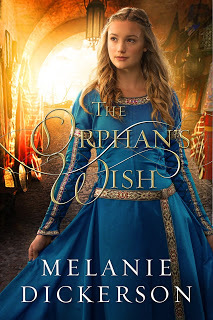 And now for the "surprise news" I've been posting on my social media. I am self-publishing a new book in a month and a half. It's a book I wrote over 10 years ago, a book I always hoped would be the first in a series of books set in my neck of the woods, the place I've lived nearly my whole life--the Deep South. So instead of "playing it safe" and sticking with Medieval fairy tale retellings, traditional publishers, and another Regency romance series, I'm branching out to write what's been on my heart for a while, my Southern series.
And now for the "surprise news" I've been posting on my social media. I am self-publishing a new book in a month and a half. It's a book I wrote over 10 years ago, a book I always hoped would be the first in a series of books set in my neck of the woods, the place I've lived nearly my whole life--the Deep South. So instead of "playing it safe" and sticking with Medieval fairy tale retellings, traditional publishers, and another Regency romance series, I'm branching out to write what's been on my heart for a while, my Southern series.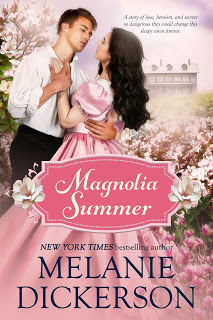 Truett Beverly’s hometown needed a doctor, so after finishing medical school, he returned to Bethel Springs, Alabama. Fighting a secret war with a corrupt lawman wasn’t in his plans, but Sheriff Suggs thinks he’s above the law and can lynch anyone who crosses him. When Suggs threatens his childhood friend, Truett dons a cape and hood and rescues him—placing “the Hooded Horseman” in Sheriff Suggs’s crosshairs.
Truett Beverly’s hometown needed a doctor, so after finishing medical school, he returned to Bethel Springs, Alabama. Fighting a secret war with a corrupt lawman wasn’t in his plans, but Sheriff Suggs thinks he’s above the law and can lynch anyone who crosses him. When Suggs threatens his childhood friend, Truett dons a cape and hood and rescues him—placing “the Hooded Horseman” in Sheriff Suggs’s crosshairs. Celia Wilcox arrives in Bethel Springs in June of 1880. She’s come from Nashville to help her sister care for their younger siblings. She hopes only to be on the small farm for the summer, just until her mother recovers from the shock of Celia’s father’s death. She must return to Nashville to fulfill her dream of opening her own dress shop.
The lovely Celia catches Truett’s eye, and he finds himself wanting to impress her. But she flatly refuses to flirt with him or to fall for his—if he does say so himself—considerable charm.
Celia’s overwhelming attraction to Truett terrifies her. What will happen when Sheriff Suggs discovers Truett is the Hooded Horseman? Will Celia be able to prevent the sheriff from carrying out one last lynching? Or will her worst fears come true?
You can pre-order it on Amazon!
Published on July 17, 2018 21:00
Her Cowboy Reunion Release Day!!!
This is flagrant.
Unlike basketball, it is not a flagrant foul. It is flagrant self-pormotion for the start of a whole new Love Inspired series "Shepherd's Crossing"...
SHEPHERDS CROSSING MEME HERE. IF I GET ONE MADE!!!
And a whole block of new Westerns that I've written!
SO WE MUST CELEBRATE!!!!!
COFFEE!!!! (done, coffee and tea bar is set up to the left of French doors)
MIMOSAS!!!!! (what exactly is a mimosa???)
HOBNOBBING ON THE PATIO!!!! (do we have a patio?)
LIVE MUSIC!!! (Pandora....)
CAPTAIN JACK FROM OLD SEEKERVILLE DAYS!!!! (Oh, Captain Jack! You rogue!)
AND FOOD, FOOD, FOOD! (now that part I can handle!)
We've gotten a little blase about releases over the past few years. Once we all got published with traditional publishers, we kind of expected releases and forgot to celebrate the absolute amazement of being published authors, of having regular contracts, of being part of the group we worked so hard to join....
How silly of us! With so many folks striving toward that same goal, how frightfully thin of us to treat it like casual news. I'm here to say there is nothing casual about it.... so today we celebrate a new book... a new series... a new setting in western Idaho and a whole new cast of characters.
The Bible tells us to celebrate good times.
The Lord wishes his people joy. That joy, joy, joy, joy down in their hearts.
And celebrating things like this isn't lauding... it's recognizing that we should never take success or opportunity for granted.
It should be worked for and attained... but not casually expected.
So today there is no big writing lesson to be learned. Today there is simply time to have fun. To realize that some rewards take longer than others (yes, I wrote for seven years before I got The Call)... and that with those rewards comes humility and a paycheck.
BOTH ARE GOOD!!!
And the fun of writing westerns and cowboys and cattle, sheep, donkeys, horses, dogs, cats, kittens, puppies, birds.... There is something so refreshing about being part of the land in these stories. And while Shepherds Crossing (the town) needs a fair share of work, the people coming to town-- and staying-- have some great ideas.
I think you'll love book one, a great reunion romance... and book two is a Christmas novella that is packaged with the very most wonderfully engaging and delightful Linda Goodnight. What an absolute joy to work with her!
And following right on the heels of that is "A Cowboy in Shepherd's Crossing" a beautiful story of living a lie.... only the hero didn't know he was living a lie. And when the truth comes to light, there's a lot of reckoning going on. But here's the heart of reckoning on a farm or ranch....
You're too busy to sit around moping.
Way too busy.
So the mopes go away eventually because there's work to be done and there's only so many people to get it done...
We'll have more reasons to celebrate this year, for lots of us, but today, if you're looking for a beach read, or a nighttime read, or an afternoon on the porch read.... Well, shucks, ma'am.
Here it is. LINK TO AMAZON, DARLINGS....
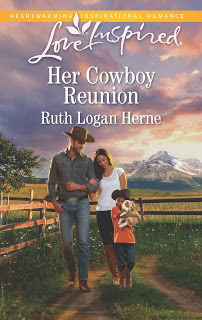 Or find this wonderful book on the shelves at Walmart, Kroger, Winn Dixie or wherever mass market paperbacks are sold!
Or find this wonderful book on the shelves at Walmart, Kroger, Winn Dixie or wherever mass market paperbacks are sold!
Unlike basketball, it is not a flagrant foul. It is flagrant self-pormotion for the start of a whole new Love Inspired series "Shepherd's Crossing"...
SHEPHERDS CROSSING MEME HERE. IF I GET ONE MADE!!!
And a whole block of new Westerns that I've written!
SO WE MUST CELEBRATE!!!!!
COFFEE!!!! (done, coffee and tea bar is set up to the left of French doors)
MIMOSAS!!!!! (what exactly is a mimosa???)
HOBNOBBING ON THE PATIO!!!! (do we have a patio?)
LIVE MUSIC!!! (Pandora....)
CAPTAIN JACK FROM OLD SEEKERVILLE DAYS!!!! (Oh, Captain Jack! You rogue!)
AND FOOD, FOOD, FOOD! (now that part I can handle!)
We've gotten a little blase about releases over the past few years. Once we all got published with traditional publishers, we kind of expected releases and forgot to celebrate the absolute amazement of being published authors, of having regular contracts, of being part of the group we worked so hard to join....
How silly of us! With so many folks striving toward that same goal, how frightfully thin of us to treat it like casual news. I'm here to say there is nothing casual about it.... so today we celebrate a new book... a new series... a new setting in western Idaho and a whole new cast of characters.
The Bible tells us to celebrate good times.
The Lord wishes his people joy. That joy, joy, joy, joy down in their hearts.
And celebrating things like this isn't lauding... it's recognizing that we should never take success or opportunity for granted.
It should be worked for and attained... but not casually expected.
So today there is no big writing lesson to be learned. Today there is simply time to have fun. To realize that some rewards take longer than others (yes, I wrote for seven years before I got The Call)... and that with those rewards comes humility and a paycheck.
BOTH ARE GOOD!!!
And the fun of writing westerns and cowboys and cattle, sheep, donkeys, horses, dogs, cats, kittens, puppies, birds.... There is something so refreshing about being part of the land in these stories. And while Shepherds Crossing (the town) needs a fair share of work, the people coming to town-- and staying-- have some great ideas.
I think you'll love book one, a great reunion romance... and book two is a Christmas novella that is packaged with the very most wonderfully engaging and delightful Linda Goodnight. What an absolute joy to work with her!
And following right on the heels of that is "A Cowboy in Shepherd's Crossing" a beautiful story of living a lie.... only the hero didn't know he was living a lie. And when the truth comes to light, there's a lot of reckoning going on. But here's the heart of reckoning on a farm or ranch....
You're too busy to sit around moping.
Way too busy.
So the mopes go away eventually because there's work to be done and there's only so many people to get it done...
We'll have more reasons to celebrate this year, for lots of us, but today, if you're looking for a beach read, or a nighttime read, or an afternoon on the porch read.... Well, shucks, ma'am.
Here it is. LINK TO AMAZON, DARLINGS....
 Or find this wonderful book on the shelves at Walmart, Kroger, Winn Dixie or wherever mass market paperbacks are sold!
Or find this wonderful book on the shelves at Walmart, Kroger, Winn Dixie or wherever mass market paperbacks are sold!
Published on July 17, 2018 12:00
July 15, 2018
Using Settings to Tap Your Reader's Imagination
by Jan Drexler
In my June post, I talked about giving your readers a complete story experience by immersing them in your fictional world. We discussed how to make that world come alive for you, the writer. You can read that post here.
Today we’re going to take your story world a step further: how to convey what you see in your mind onto the page and into your reader’s imagination.
Because, really, isn’t that the where the magic of story-telling happens?
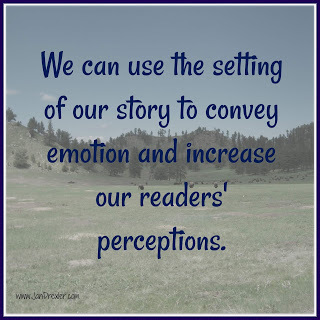
We use the setting of each scene to convey emotion and increase our reader’s perception of our themes. Every word reveals details about the scene that provides an undercurrent to strengthen the action and dialogue. Many writers talk about using your setting as another character in the scene, but I think it goes further than that.
Yes, your characters interact with the setting, but the setting also creates a framework that helps to communicate your theme and subtexts more effectively than any other aspect of your story.
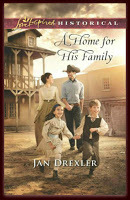
To help illustrate what I’m talking about, I’m going to use some scenes from one of my early books, A Home for His Family, published by Love Inspired in September 2015.
The opening scene of the book takes place in a gulch outside of Deadwood, Dakota Territory, in 1877. Yup, that’s right. Just like in a Hopalong Cassidy story. It’s May, there’s a snowstorm coming, and it’s one of only three roads into town. The spring influx of miners is arriving, and the place is a chaotic mess.
The heroine, Sarah, and her Aunt Margaret have been traveling to Deadwood in a stagecoach and are anxious to get to the end of their journey. But there is a delay ahead of them on the trail and the stagecoach is stuck until traffic starts moving again.
 Deadwood, South Dakota
Deadwood, South Dakota
Here is Sarah’s first glimpse of the setting:
Sarah climbed out of the stagecoach, aching for a deep breath. With a cough, she changed her mind. The air reeked of dung and smoke in this narrow valley. She held her handkerchief to her nose and coughed again. Thick with fog, the canyon rang with the crack of whips from the bull train strung out on the half-frozen trail ahead. She pulled her shawl closer around her shoulders and shook one boot, but the mud clung like gumbo.
In describing this scene, I wanted to show the unexpected hardships Sarah was facing in her new adventure, but also her determination to follow through with her plans. So I let her leave the stagecoach to get some fresh air, but then she comes nose-to-nose with reality. The weather creates an oppressive layer of fog that obscures her vision and concentrates the odors of hundreds of animals and men confined in a narrow space.
There’s a subtext going on in this description, too. Sarah has come to Deadwood to bring the light of education to the children in the town and to the prostitutes who make up a significant number of the female population in 1877. A recurring theme in the story is that the prostitutes are trapped and confined in their lives with little hope for escape. The narrow gulch in this first scene is the reader’s – and Sarah’s – first hint of that unsavory reality.
This isn’t the only place I use the setting to convey that subtext. I scatter it throughout the story:
This cabin and a few others were perched on the rimrock above the mining camp, as if at the edge of a cesspool. Up here the sun was just lifting over the tops of the eastern mountains, while the mining camp below was still shrouded in pre-dawn darkness.
* * * * *
The businesses crowded together between the hills rising behind them and the narrow mud hole that passed for a street. Nate slowed his pace as the storefronts turned from the saloons to a printing office. Next came a general store and a clothing store, with a tobacconist wedged in between. Across the street was Star and Bullock, a large hardware store that filled almost an entire block.
And in the middle of it all, just where the street took a steep slope up to a higher level on the hill, men worked a mining claim. Nate shook his head. In all his travels through the West, he had never seen anything quite like Deadwood.
But even amid the chaos of the mining town, Sarah’s spirit is focused on her goals. I use descriptions like this one to show Sarah’s hopeful courage:
Sarah took the bucket to the door and tossed the dirty water into the gutter. As she did every day, she looked past the crowded streets and crooked roofs of the neighboring buildings to the towering hills beyond. She let the bucket dangle and leaned against the door frame as she gazed at the white rocks at the top of Boot Hill. What would it be like to climb that mountain someday?
 Deadwood from White Rocks
Deadwood from White Rocks
Another aspect of any story is contrast. In this story it is between chaos and order; sin and forgiveness; the wandering life and home.
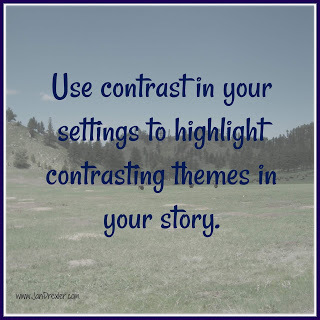
How can you convey the contrasts in your story? Choose your words carefully.
Yesterday's rain had made a miry mess of the streets. Horses walked in mud nearly up to their knees, while the drivers of the wagons shouted curses to keep their teams from stopping before they got to firmer ground.
Sarah crossed Lee Street on the wooden crosswalk and paused on the corner, looking up and down Main. Aunt Margaret had been right. The saloon girls crowded the board walks in front of the stores, their bright silk dresses and fancy plumed hats lining the street like a show of exotic tropical flowers. Not one “respectable” woman was in sight.
Finally, she caught sight of Maude’s red dress and purple shawl in a cluster of girls outside a peanut vendor next to The Big Horn Grocery on Upper Main. She hurried across the street on the wooden walk, soaking her kid shoes in the slime as the boards sank into the mud beneath the weight of the crowd doing the same. Thankfully, she climbed the stairs between Lower and Upper Main, out of the mud for a change.
Compare that to Nate observing Sarah’s first view of the land where he intends to establish his home:
He drove the team along a natural shelf on the side of the slope and then turned up. As they crested the rise, the sight that greeted him still took his breath away.
Green meadows stretched away in a wide swath at least a half mile across and twice that long, curving around the wooded slopes that crowded close to the open space. An eagle drifted above them against the clear blue sky.
Sarah whispered, “It’s perfect.”
Nate chirruped to the horses, driving them slowly through the knee-deep grass, heading for the grove of trees at the far edge. In his mind the mountain valley was dotted with horses—brown, black, white, gray—all grazing on the rich green grass that grew in a thick carpet everywhere he looked. Across the meadow, a meandering line of cottonwood trees followed a fold in the grass. That stream cutting through the land was the crowning touch.
He glanced at Sarah, still standing in the wagon bed, holding on to the seat between him and James. Her face was bright in the clear sunshine, the wind pulling loose hair from her bun. Her gaze went up to the tops of the hills surrounding them.
When she looked at him she smiled, and his heart swelled. Everywhere he looked he saw his future, waiting for him to reach out and grasp it. It was as if the past twelve years had never happened and he was just starting out, full of promise.
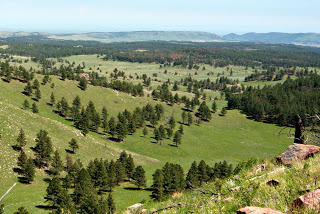
What is the biggest difference between these two scenes? It isn’t only the contrast between the crowded streets of Deadwood and the open spaciousness of Nate’s land.
In the description of the town, I used a lot of words with hard consonants: curses, crosswalk, corner, crowded, walk, silk, exotic, respectable, kid…along with some “dirty” words for good measure: mud, mess, soaking, slime, sank.
But in the description of Nate’s land? The opposite. I used soft consonants and “clean” words: green meadows, meandering, wide swath, curving around, wooded slopes, drifted, clear blue sky, swelled, full of promise.
Words are important – not only their meanings, but their sounds. The soft consonants convey the underlying theme present in all my books: home.
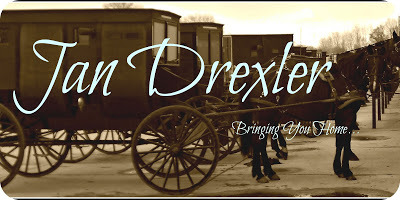
Do my readers notice these details? Not consciously. But they play a role in the total reading experience.

Now I’d love to hear your ideas. How do you use your settings to add depth to your stories? Or for readers, how do carefully written settings add to your reading experience?
"A Home for His Family" is now out of print, but the e-book is still available! One commenter will win a Kindle copy of their very own!
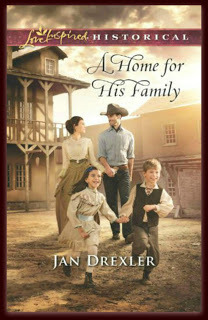 The Rancher's Ready-Made Family
The Rancher's Ready-Made Family
Nate Colby came to the Dakota Territory to start over, not to look for a wife. He'll raise his orphaned nieces and nephew on his own, even if pretty schoolteacher Sarah MacFarland's help is a blessing. But Nate resists getting too close—Sarah deserves better than a man who only brings trouble to those around him.
Sarah can't deny she cares for the children, but she can't let herself fall for Nate. Her childhood as an orphan taught her that opening her heart to love only ends in hurt. Yet helping this ready-made family set up their ranch only makes her long to be a part of it—whatever the risk.
Order your copy here!
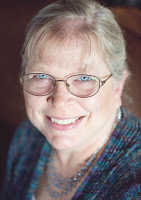 Jan Drexler lives in the Black Hills of South Dakota with her husband of (almost) thirty-six years and expanding family. While she writes Historical Romance with Amish characters, the romance of cowboys surrounds her, tugging more story ideas from her imagination than she can hope to write in one lifetime.
Jan Drexler lives in the Black Hills of South Dakota with her husband of (almost) thirty-six years and expanding family. While she writes Historical Romance with Amish characters, the romance of cowboys surrounds her, tugging more story ideas from her imagination than she can hope to write in one lifetime.
In my June post, I talked about giving your readers a complete story experience by immersing them in your fictional world. We discussed how to make that world come alive for you, the writer. You can read that post here.
Today we’re going to take your story world a step further: how to convey what you see in your mind onto the page and into your reader’s imagination.
Because, really, isn’t that the where the magic of story-telling happens?

We use the setting of each scene to convey emotion and increase our reader’s perception of our themes. Every word reveals details about the scene that provides an undercurrent to strengthen the action and dialogue. Many writers talk about using your setting as another character in the scene, but I think it goes further than that.
Yes, your characters interact with the setting, but the setting also creates a framework that helps to communicate your theme and subtexts more effectively than any other aspect of your story.

To help illustrate what I’m talking about, I’m going to use some scenes from one of my early books, A Home for His Family, published by Love Inspired in September 2015.
The opening scene of the book takes place in a gulch outside of Deadwood, Dakota Territory, in 1877. Yup, that’s right. Just like in a Hopalong Cassidy story. It’s May, there’s a snowstorm coming, and it’s one of only three roads into town. The spring influx of miners is arriving, and the place is a chaotic mess.
The heroine, Sarah, and her Aunt Margaret have been traveling to Deadwood in a stagecoach and are anxious to get to the end of their journey. But there is a delay ahead of them on the trail and the stagecoach is stuck until traffic starts moving again.
 Deadwood, South Dakota
Deadwood, South DakotaHere is Sarah’s first glimpse of the setting:
Sarah climbed out of the stagecoach, aching for a deep breath. With a cough, she changed her mind. The air reeked of dung and smoke in this narrow valley. She held her handkerchief to her nose and coughed again. Thick with fog, the canyon rang with the crack of whips from the bull train strung out on the half-frozen trail ahead. She pulled her shawl closer around her shoulders and shook one boot, but the mud clung like gumbo.
In describing this scene, I wanted to show the unexpected hardships Sarah was facing in her new adventure, but also her determination to follow through with her plans. So I let her leave the stagecoach to get some fresh air, but then she comes nose-to-nose with reality. The weather creates an oppressive layer of fog that obscures her vision and concentrates the odors of hundreds of animals and men confined in a narrow space.
There’s a subtext going on in this description, too. Sarah has come to Deadwood to bring the light of education to the children in the town and to the prostitutes who make up a significant number of the female population in 1877. A recurring theme in the story is that the prostitutes are trapped and confined in their lives with little hope for escape. The narrow gulch in this first scene is the reader’s – and Sarah’s – first hint of that unsavory reality.
This isn’t the only place I use the setting to convey that subtext. I scatter it throughout the story:
This cabin and a few others were perched on the rimrock above the mining camp, as if at the edge of a cesspool. Up here the sun was just lifting over the tops of the eastern mountains, while the mining camp below was still shrouded in pre-dawn darkness.
* * * * *
The businesses crowded together between the hills rising behind them and the narrow mud hole that passed for a street. Nate slowed his pace as the storefronts turned from the saloons to a printing office. Next came a general store and a clothing store, with a tobacconist wedged in between. Across the street was Star and Bullock, a large hardware store that filled almost an entire block.
And in the middle of it all, just where the street took a steep slope up to a higher level on the hill, men worked a mining claim. Nate shook his head. In all his travels through the West, he had never seen anything quite like Deadwood.
But even amid the chaos of the mining town, Sarah’s spirit is focused on her goals. I use descriptions like this one to show Sarah’s hopeful courage:
Sarah took the bucket to the door and tossed the dirty water into the gutter. As she did every day, she looked past the crowded streets and crooked roofs of the neighboring buildings to the towering hills beyond. She let the bucket dangle and leaned against the door frame as she gazed at the white rocks at the top of Boot Hill. What would it be like to climb that mountain someday?
 Deadwood from White Rocks
Deadwood from White RocksAnother aspect of any story is contrast. In this story it is between chaos and order; sin and forgiveness; the wandering life and home.

How can you convey the contrasts in your story? Choose your words carefully.
Yesterday's rain had made a miry mess of the streets. Horses walked in mud nearly up to their knees, while the drivers of the wagons shouted curses to keep their teams from stopping before they got to firmer ground.
Sarah crossed Lee Street on the wooden crosswalk and paused on the corner, looking up and down Main. Aunt Margaret had been right. The saloon girls crowded the board walks in front of the stores, their bright silk dresses and fancy plumed hats lining the street like a show of exotic tropical flowers. Not one “respectable” woman was in sight.
Finally, she caught sight of Maude’s red dress and purple shawl in a cluster of girls outside a peanut vendor next to The Big Horn Grocery on Upper Main. She hurried across the street on the wooden walk, soaking her kid shoes in the slime as the boards sank into the mud beneath the weight of the crowd doing the same. Thankfully, she climbed the stairs between Lower and Upper Main, out of the mud for a change.
Compare that to Nate observing Sarah’s first view of the land where he intends to establish his home:
He drove the team along a natural shelf on the side of the slope and then turned up. As they crested the rise, the sight that greeted him still took his breath away.
Green meadows stretched away in a wide swath at least a half mile across and twice that long, curving around the wooded slopes that crowded close to the open space. An eagle drifted above them against the clear blue sky.
Sarah whispered, “It’s perfect.”
Nate chirruped to the horses, driving them slowly through the knee-deep grass, heading for the grove of trees at the far edge. In his mind the mountain valley was dotted with horses—brown, black, white, gray—all grazing on the rich green grass that grew in a thick carpet everywhere he looked. Across the meadow, a meandering line of cottonwood trees followed a fold in the grass. That stream cutting through the land was the crowning touch.
He glanced at Sarah, still standing in the wagon bed, holding on to the seat between him and James. Her face was bright in the clear sunshine, the wind pulling loose hair from her bun. Her gaze went up to the tops of the hills surrounding them.
When she looked at him she smiled, and his heart swelled. Everywhere he looked he saw his future, waiting for him to reach out and grasp it. It was as if the past twelve years had never happened and he was just starting out, full of promise.

What is the biggest difference between these two scenes? It isn’t only the contrast between the crowded streets of Deadwood and the open spaciousness of Nate’s land.
In the description of the town, I used a lot of words with hard consonants: curses, crosswalk, corner, crowded, walk, silk, exotic, respectable, kid…along with some “dirty” words for good measure: mud, mess, soaking, slime, sank.
But in the description of Nate’s land? The opposite. I used soft consonants and “clean” words: green meadows, meandering, wide swath, curving around, wooded slopes, drifted, clear blue sky, swelled, full of promise.
Words are important – not only their meanings, but their sounds. The soft consonants convey the underlying theme present in all my books: home.

Do my readers notice these details? Not consciously. But they play a role in the total reading experience.

Now I’d love to hear your ideas. How do you use your settings to add depth to your stories? Or for readers, how do carefully written settings add to your reading experience?
"A Home for His Family" is now out of print, but the e-book is still available! One commenter will win a Kindle copy of their very own!
 The Rancher's Ready-Made Family
The Rancher's Ready-Made Family
Nate Colby came to the Dakota Territory to start over, not to look for a wife. He'll raise his orphaned nieces and nephew on his own, even if pretty schoolteacher Sarah MacFarland's help is a blessing. But Nate resists getting too close—Sarah deserves better than a man who only brings trouble to those around him.
Sarah can't deny she cares for the children, but she can't let herself fall for Nate. Her childhood as an orphan taught her that opening her heart to love only ends in hurt. Yet helping this ready-made family set up their ranch only makes her long to be a part of it—whatever the risk.
Order your copy here!
 Jan Drexler lives in the Black Hills of South Dakota with her husband of (almost) thirty-six years and expanding family. While she writes Historical Romance with Amish characters, the romance of cowboys surrounds her, tugging more story ideas from her imagination than she can hope to write in one lifetime.
Jan Drexler lives in the Black Hills of South Dakota with her husband of (almost) thirty-six years and expanding family. While she writes Historical Romance with Amish characters, the romance of cowboys surrounds her, tugging more story ideas from her imagination than she can hope to write in one lifetime.
Published on July 15, 2018 21:00
July 13, 2018
Weekend Edition

If you are not familiar with our giveaway rules, take a minute to read them here. It keeps us all happy! All winners should send their name, address, and phone number to claim prizes. Note our new email address and please send your emails to Seekerville2@gmail.com

Monday: Missy Tippens brought you tips for writing devotionals. She decided to pick two winners for a devotional critique/brainstorming. Congratulations to Wilani and Edwina Cowgill!
Tuesday: Rachelle Dekker was in the house, talking about writing her first suspense novel. And she's giving away two copies of When Through Deep Waters. Winners are Sandy Smith and Karen Sargent! Congrats!
Wednesday: Ruth Logan Herne spent the day chatting with writers and readers, talking about taking your business seriously... like you do your writing! Winners of "Her Cowboy Reunion", Ruthy's newest Love Inspired book are Wilani Wahl, Laura Kestner and Winnie Thomas!
Friday: Carrie entertained (and swooned) with her continuing thoughts on Creating a Swoonilicious kiss!! ~~Kiss and Tell, Part II! Her winner is Laurie Wood! (Let us know which book you want!)

Monday: Jan Drexler is continuing her look at story worlds with her post, Using Settings to Tap Your Readers' Imaginations. One commenter will win an e-book copy of her only non-Amish story so far, "A Home for His Family!"
Tuesday: Join Ruth Logan Herne for a release party for "Her Cowboy Reunion", the first book of her new "Shepherd's Crossing" series. THIS BOOK RELEASES TODAY!!! PARTY!!! PRIZES!!! HAPPY FACES!!! FREE PRETEND FOOD!!!
Wednesday: Melanie Dickerson is our hostess as she talks about what it means to write with confidence!!!
Thursday: We welcome Richard Mabry back to Seekerville! Friday: Special guest Matt Mikalatos is visiting with a post about 7 Ways Fiction Can Break through When Nonfiction Fails. And he's giving away a copy of his book The Crescent Stone to one lucky commenter

 Pam Hillman is participating in a Historical Romance
Pam Hillman is participating in a Historical RomanceBOOKBUB and Facebook Builder.
Lots of ways to win. Ends July 15th.
(If I understand the Rafflecopter correctly, there are 32 ways to win! Wow!) Click here to Participate
 Pam again... still celebrating the release of
The Road to Magnolia Glen
. :)
Pam again... still celebrating the release of
The Road to Magnolia Glen
. :)I'm a sponsor at the Christian Fiction Summer Reading Safari.
Read! Review! Win books! (It really is that easy!)
Click here to join the fun for the entire month of July!
Melanie Dickerson's fairy tale series got a new addition in the form of an Aladdin retelling a couple of weeks ago. Now on sale at online retailers, including Amazon, and a book store near you.
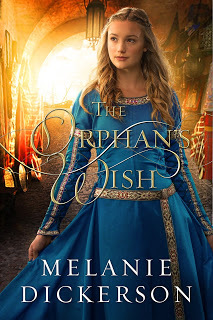
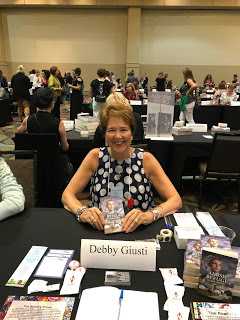
ROMANCE WRITERS OF AMERICA NATIONAL CONFERENCE2018 Literacy Autographing InformationWhen: Saturday, July 21, 3:00 - 5:00 p.m. MTWhere: Sheraton Denver Downtown Hotel, Plaza Ballroom (Plaza Building, Concourse Level)Proceeds from book sales benefit ProLiteracy Worldwide and Literacy Coalition of ColoradoThis event is open to the public and is free of charge to attend.More than 400 authors will be signing, including our own DEBBY GIUSTI. The seatingis alphabetical so look for Debby in the "G" row and be sure to stop by hertable and say hello!
The Seeker gals have been VERY busy! Jan Drexler's first book in her new series, "The Amish of Weaver's Creek" is available for preorder wherever great books are sold!
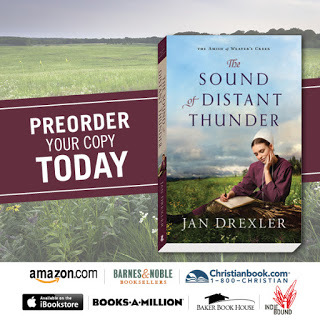

Announcing Bookfunnel Print Codes at the Bookfunnel blog.
The Plot Clock: The Structure Template that Saved my Career by Joyce Sweeney at Fiction University.
Compiling a DOCX in Scrivener 3 by Gwen Hernandez at Writer Unboxed
Raves and Rants for July ~ Perfect Possessives by Amanda Cabot at An Indie Adventure
Watch The RITA and Golden Heart Ceremonies LIVE! courtesy of Romance Writers of America
Writing A Series: 7 Continuation Issues to Avoid by Joanna Penn at The Creative Penn
6 Ways to Manipulate Time In Fiction by Martin Cavannagh at Live, Write, Thrive
Published on July 13, 2018 21:00
July 12, 2018
Kiss and Tell (part two): Creating a Swoonilicious Kiss
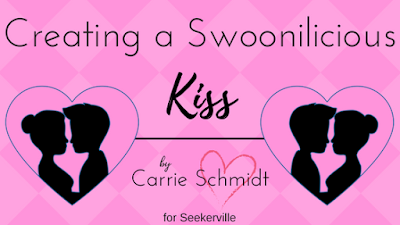
Happy FRIDAY, Seekerville! Let's just ignore the fact that it's Friday the 13th and talk about something much more pleasant: KISSES. Specifically, KISSES in fiction.
Ever since I fell in love with the story of Cinderella, I've been in love with "KissingBooks" (if you're a Princess Bride fan, you probably get the reference). When I started blogging about Christian and clean fiction, KissingBooks quickly became my most popular series of posts. Romance is still a hot genre (pardon the pun) and reading Christian & clean romance doesn't mean we have to sacrifice passion. After all, God created passion and romance and, when in the proper context, the expression of that passion glorifies him. Of course there are certain lines that we don't want to cross in fiction (or in life) but within these parameters Christian authors write a wide range of sweet kisses to smokin' smooches and everything in between!
Much like I did in my last Seekerville post (where I profiled my fave book boyfriends and what makes them swoonilicious), today I'm going to look at my four fave kissing scenes and analyze what they have in common and why they're so swoonilicious!
Let's look at the kisses first!
(These are in no particular order, by the way)
Cue the romantic music ...
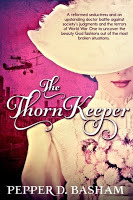
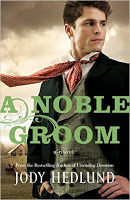
Fave Kiss #1: David & Catherine's first kiss in The Thorn Keeper by Pepper Basham - A storage closet, a reformed bad girl, and a dashing British doctor. "'Heaven help me, you taste like Christmas!' She breathed between them, keeping her mouth close enough to feel the warmth of his breath."
Fave Kiss #2: Carl & Annalisa's rain kiss in The Noble Groom by Jody Hedlund - "His gaze didn’t waver from her lips, even when he reached up both hands – one on either side of her face – and intertwined them into the long damp strands of her hair."
Fave Kiss #3: Katie & Luke's office kiss in A Hope Undaunted by Julie Lessman - "The taste of her lips was far more than he bargained for, and he drew her close with a raspy groan."
Fave Kiss #4: Vance & Violet's alcove kiss in The Cautious Maiden by Dawn Crandall - "'Violet,' he repeated quickly, between kisses and labored breaths, his hands still pressed against the small of my back. 'Violet, you have no idea -'"
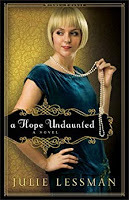
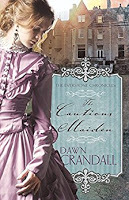
What do these four fave kisses have in common?
1. Emotion. Raspy voices, the inability to breathe, trembling hands. There is more driving these kisses than merely attraction. Something connects the two kissees (is that a word?) on an almost soul-deep level, and that emotion results in some pretty passionate kisses! The sense of knowing this person is different, this person is your person, this person is 'the one' - and the raw need to communicate that to him/her when words fail you
2. Worth the Wait. This often goes hand-in-hand (or lip-to-lip?) with 'emotion' but each of these kisses was fueled by a need that had been continually repressed for one reason or another. Whether it is because they've been kept apart by distance or misunderstanding, or because the hero (or heroine) is trying to do the noble thing and resist the relationship. Whatever the reason, once the decision to smooch has been made, there is no longer any holding back! (And when I say 'no holding back', I'm still just talking kisses here. No bedroom shenanigans!)
3. Cherished. Passion notwithstanding, these kisses come from a heart that cherishes the other person, the relationship, the emotion, the act of the kiss. It's not so much about taking as it is about giving, about somehow telling this person without words how much he/she means to you. Because you can't find the words to adequately describe your heart toward him/her (back to 'emotion' again)
4. Passion. Yep. I went there. These aren't mere brushes of the lips (although there's certainly a place for that too). These are 'pucker up and turn on the a/c' kinds of kisses. The kind that make you want to say "WOWZA" out loud while you're reading. (And sometimes you do and then you get funny looks.) Now, please don't misunderstand. A passionate kiss doesn't have to be hot n' heavy and full of sparks and sizzle. Sometimes, the most passionate kiss is the one that comes from a gentle heart full of more love than that heart can contain. But it still has passion, no matter how quiet.
Again, take my advice with a grain of salt. I'm just one reader with her own preferences. But I will say that these four kisses always come up in 'favorite kiss discussions' and not just from me haha! So there is something about them that appeals to a wide variety of readers, and I think these four characteristics (Emotion, Worth the Wait, Cherished, Passion) are a good start in figuring out what makes them so memorable.
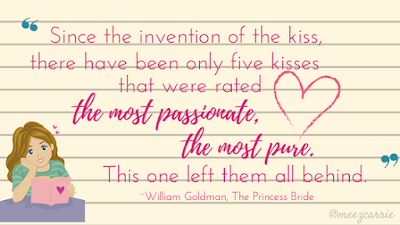
Authors: What do you find most difficult about writing a swoony kiss?
Readers: What are some of your favorite book kisses?
Let me know in the comments & you'll be entered to win ONE BOOK of your choice from one of the four books I featured today in my fave kisses.
Giveaway is open internationally, provided Book Depository has the book of your choice and ships to your location. Void where prohibited by law.
Published on July 12, 2018 21:00



